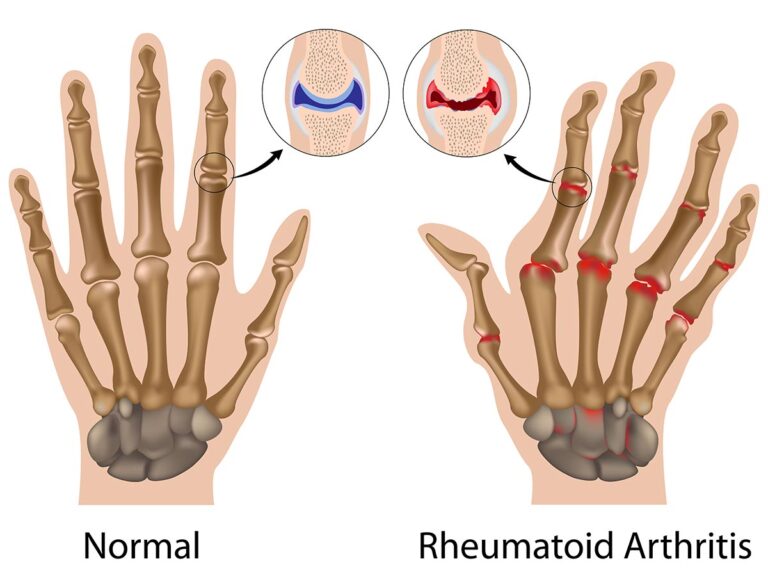Rheumatoid arthritis (RA) is a chronic autoimmune disease that attacks the joints, causing inflammation, pain, and stiffness. It can affect any joint in the body, but most commonly targets the hands, wrists, knees, and ankles. While RA can be a debilitating condition, understanding its nature, symptoms, and treatment options empowers individuals to manage the disease and live fulfilling lives.
Unveiling the Cause:
The exact cause of Rheumatoid arthritis remains a mystery, but it is believed to involve a complex interplay of genetic and environmental factors:
- Genetics: Having a family history of RA increases the risk significantly.
- Immune system dysfunction: An overactive immune system mistakenly attacks healthy tissues in the joints, leading to inflammation and damage.
- Environmental triggers: Certain environmental triggers, such as smoking, infections, and hormonal changes, may trigger or worsen RA symptoms.
Recognizing the Signs and Symptoms:
Rheumatoid arthritis symptoms can vary greatly from person to person and may come and go in flare-ups. Some common signs include:
- Joint pain, swelling, and stiffness: This is the most common symptom, often affecting the hands, wrists, knees, and ankles in a symmetrical pattern.
- Morning stiffness: Difficulty getting out of bed or starting the day due to stiffness in the joints is a hallmark symptom.
- Fatigue: Persistent tiredness is a common symptom that can significantly impact daily activities.
- Fever: Although not always present, a low-grade fever can be a symptom of RA.
- Loss of appetite and weight loss: Chronic inflammation and pain can lead to unintentional weight loss.
- Skin rashes: Some individuals with RA may experience a butterfly-shaped rash across the cheeks and nose.
Diagnosing Rheumatoid Arthritis:
Diagnosing Rheumatoid arthritis can be challenging due to the diverse and sometimes non-specific nature of its symptoms. Doctors typically rely on a combination of factors:
- Medical history and physical examination: Assessing symptoms, family history, and physical limitations.
- Blood tests: Testing for inflammatory markers like C-reactive protein (CRP) and erythrocyte sedimentation rate (ESR).
- Imaging tests: X-rays, MRIs, and CT scans can reveal joint damage and inflammation.
- Rheumatoid factor (RF) and anti-CCP antibodies: While not always present, these blood tests can indicate the presence of RA.
Treatment Options:
While there is no cure for Rheumatoid arthritis effective treatment strategies can manage pain, inflammation, and disease progression, leading to improved quality of life. Treatment options may include:
- Medications:
- Nonsteroidal anti-inflammatory drugs (NSAIDs): Reduce pain and inflammation.
- Corticosteroids: Powerful anti-inflammatory medications for severe symptoms or flares.
- Disease-modifying antirheumatic drugs (DMARDs): Slow down the progression of the disease and prevent joint damage.
- Biologic therapies: Target specific parts of the immune system for more personalized treatment.
- Therapy: Physical and occupational therapy can help maintain joint mobility, strengthen muscles, and manage pain.
- Surgery: In severe cases, surgery may be necessary to repair joint damage or replace damaged joints.
- Lifestyle changes: Maintaining a healthy diet, regular exercise, getting adequate sleep, and managing stress can significantly impact overall well-being and symptom management.
Living Well with Rheumatoid Arthritis:
Living with Rheumatoid arthritis can be challenging, but with proper management and support, individuals can lead active and fulfilling lives. Here are some tips for living well with RA:
- Build a strong relationship with your healthcare team: Regular checkups and open communication with your doctor are crucial for monitoring your condition and adjusting treatment plans as needed.
- Learn about your condition: Understanding how RA affects you empowers you to make informed decisions about your care.
- Adhere to your treatment plan: Taking medications as prescribed and attending therapy sessions are essential for managing symptoms and preventing complications.
- Stay active: Regular exercise within your tolerance can help maintain joint flexibility, strengthen muscles, and improve overall well-being.
- Manage stress: Stress can worsen symptoms. Relaxation techniques like yoga or meditation can be helpful.
- Join a support group: Connecting with others who understand what you are going through can provide emotional support and valuable advice.
- Advocate for yourself: Don’t hesitate to ask questions and communicate your needs to your healthcare providers.
Looking Forward:
Research into Rheumatoid arthritis continues to advance, leading to new treatment options and a deeper understanding of the disease. With ongoing research and proper management, individuals with RA can look forward to improved treatment outcomes and a better quality of life.
For more information: fuseinfusion.com

